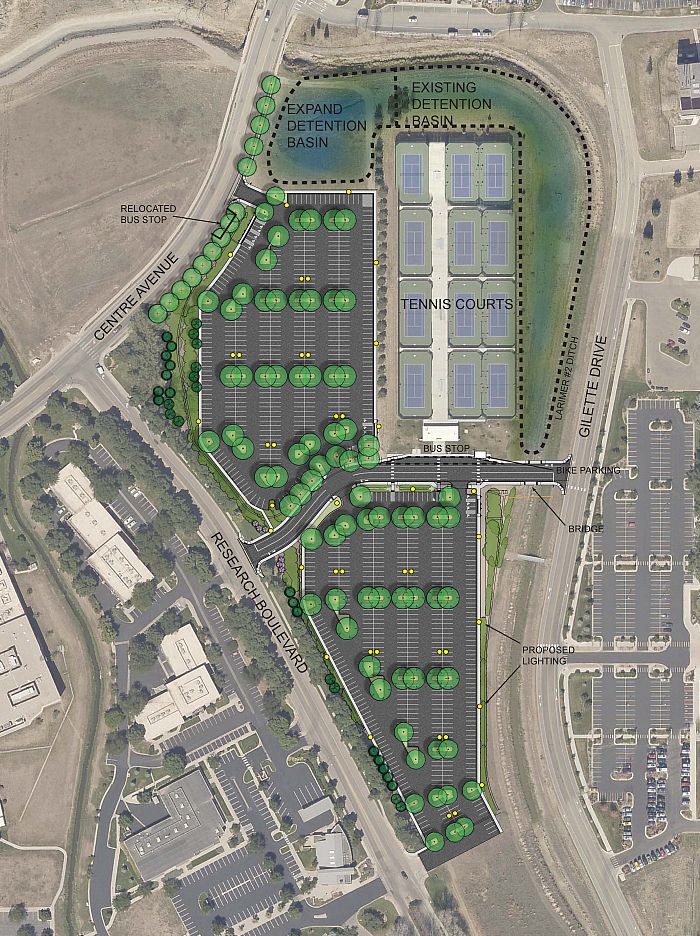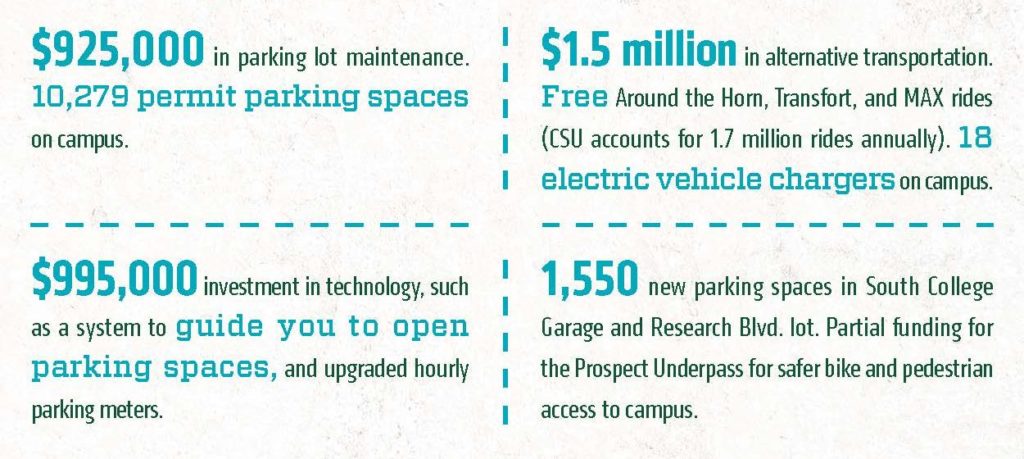New parking permit rates will go into effect for 2016-17 – and the rate increases will fund expanded parking, new technology and alternative transportation options that will benefit faculty, staff, students and guests. Current annual parking permits expire on July 31; new permits go on sale July 1 and are required Aug. 1.

New this year is a lower cost parking option – something that has been requested by CSU employee groups and students: Parking and Transportation Services will offer a reduced rate for commuters who want to park in the Research Boulevard parking lot, west of the Veterinary Teaching Hospital, and either walk or take the Around the Horn shuttle to campus. The reduced rate permit for Research Boulevard will be $315 less than a regular A permit and $270 less than a regular commuter student permit.
Below are the new rates for this year:
- Employee permits (A permits): $565
- Commuter student — students who live off campus (Z permits): $520
- Daily permits: cost $12
- Hourly parking rates for metered spaces: $1.75.
- Research Boulevard passes, available to faculty, staff and students: $250. The Research Boulevard lot is served by Around the Horn every 10 minutes from 7 a.m. to 7 p.m. weekdays, and every half hour during summer session and on all Saturdays. There is no Sunday service. This pass is only valid in the Research Blvd lot.
State classified employees purchasing an A, B, J or M permit will be charged last year’s rates (A permits were $442) because the state chose to forego salary increases for classified staff for the new fiscal year starting July 1. The university will cover, for this year only, the difference between last year’s permit and this year’s permit for those employees.
Parking permits fund important programs, improvements
The permit rate increase funds several new parking and transportation improvements including:
- The new South College Parking Garage, slated to open in August. The garage provides an additional 650 parking spaces to campus inventory.
- Technology to identify the number of and location of open parking spaces in the new garage and several parking lots across campus. This system, which indicates open parking spaces with a green light above the space, is already in place in the Lake Street Garage.
- Partial funding support for the pedestrian and bicycle underpass below Prospect Road and Center Avenue, creating safer campus access from the south for pedestrians and bikes.
“Parking and Transportation Services continues to work toward providing options to faculty, staff and students, including expanded parking on campus and a substantial investment in alternative transportation, which provides free opportunities to commute to campus,” said Dave Bradford, director of Parking and Transportation Services. Parking and Transportation Services does not receive funding outside of parking permit and fine revenue; by state statute, it is required to be self-funded and receives no tuition, student fee or state funding.
Additional parking permit options, such as reduced-cost 10-packs of daily permits, carpool permits, electric vehicle permits, and monthly permits, continue to be offered. Employees making less than $35,000 per year also qualify for a discounted permit, in a continuation of a program offered in 2015 to help the university’s lowest paid employees. The program, designed by a committee that included representatives from the Administrative Professional Council, the Classified Personnel Council, and the Emergency Hardship Loan Fund committee, will automatically provide a 50 percent reduction in annual permit fees to employees who meet criteria.
Where do parking permit fees go?

Over the past three years, Parking and Transportation Services have invested parking permit revenue in a variety of improvements across campus, including added parking lots, a new parking garage (set to open by August), and technology to help commuters find open parking spaces on campus.
Parking permit fees have successfully funded alternative transportation expansion on campus, with a $1.5 million investment in a partnership with Transfort, the city’s mass transit system. Parking revenue provides free rides on MAX and all Transfort routes to all university faculty, staff and students. This revenue also funds Around the Horn, the free on-campus shuttle that provides about 1.7 million rides a year. Parking and Transportation Services also offers an Emergency Ride Home program, which provides a free ride home via a local taxi or Zipcar to people who take alternative transportation to campus and need to leave for an emergency, guaranteeing that students and employees won’t be stranded if they choose to try alternative transportation.
This permit rate increase was approved by the Board of Governors of the Colorado State University System in 2015 as part of a two-year funding structure for parking revenue. Parking and Transportation Services held permit rates steady from 2009-2011 and again from 2011-summer 2014 before recent increases, due to the economic downturn.